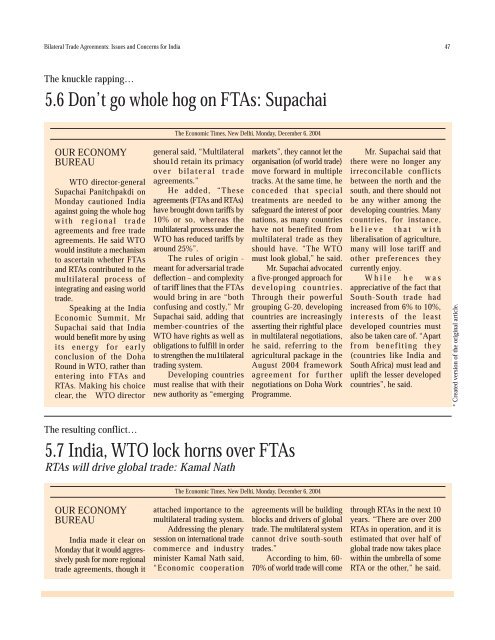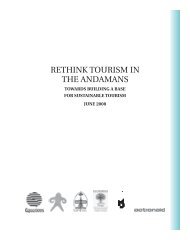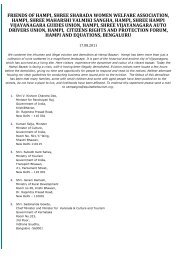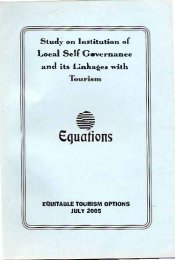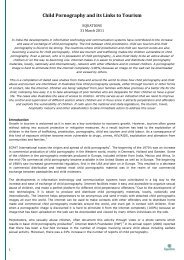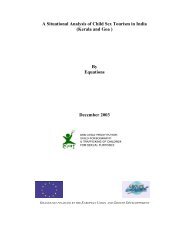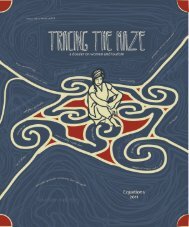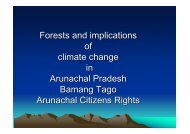Bilateral Trade Agreements â Issues and Concerns for ... - Equations
Bilateral Trade Agreements â Issues and Concerns for ... - Equations
Bilateral Trade Agreements â Issues and Concerns for ... - Equations
Create successful ePaper yourself
Turn your PDF publications into a flip-book with our unique Google optimized e-Paper software.
<strong>Bilateral</strong> <strong>Trade</strong> <strong>Agreements</strong>: <strong>Issues</strong> <strong>and</strong> <strong>Concerns</strong> <strong>for</strong> India 47<br />
The knuckle rapping…<br />
5.6 Don’t go whole hog on FTAs: Supachai<br />
OUR ECONOMY<br />
BUREAU<br />
WTO director-general<br />
Supachai Panitchpakdi on<br />
Monday cautioned India<br />
against going the whole hog<br />
with regional trade<br />
agreements <strong>and</strong> free trade<br />
agreements. He said WTO<br />
would institute a mechanism<br />
to ascertain whether FTAs<br />
<strong>and</strong> RTAs contributed to the<br />
multilateral process of<br />
integrating <strong>and</strong> easing world<br />
trade<br />
Ṡpeaking at the India<br />
Economic Summit, Mr<br />
Supachai said that India<br />
would benefit more by using<br />
its energy <strong>for</strong> early<br />
conclusion of the Doha<br />
Round in WTO, rather than<br />
entering into FTAs <strong>and</strong><br />
RTAs. Making his choice<br />
clear, the WTO director<br />
The Economic Times, New Delhi, Monday, December 6, 2004<br />
general said, “Multilateral<br />
shou1d retain its primacy<br />
over bilateral trade<br />
agreements.”<br />
He added, “These<br />
agreements (FTAs <strong>and</strong> RTAs)<br />
have brought down tariffs by<br />
10% or so, whereas the<br />
multilateral process under the<br />
WTO has reduced tariffs by<br />
around 25%”.<br />
The rules of origin -<br />
meant <strong>for</strong> adversarial trade<br />
deflection – <strong>and</strong> complexity<br />
of tariff lines that the FTAs<br />
would bring in are “both<br />
confusing <strong>and</strong> costly,” Mr<br />
Supachai said, adding that<br />
member-countries of the<br />
WTO have rights as well as<br />
obligations to fulfill in order<br />
to strengthen the mu1tilateral<br />
trading system.<br />
Developing countries<br />
must realise that with their<br />
new authority as “emerging<br />
markets”, they cannot let the<br />
organisation (of world trade)<br />
move <strong>for</strong>ward in multiple<br />
tracks. At the same time, he<br />
conceded that special<br />
treatments are needed to<br />
safeguard the interest of poor<br />
nations, as many countries<br />
have not benefited from<br />
multilateral trade as they<br />
should have. “The WTO<br />
must look global,” he said.<br />
Mr. Supachai advocated<br />
a five-pronged approach <strong>for</strong><br />
developing countries.<br />
Through their powerful<br />
grouping G-20, developing<br />
countries are increasingly<br />
asserting their rightful place<br />
in multilateral negotiations,<br />
he said, referring to the<br />
agricultural package in the<br />
August 2004 framework<br />
agreement <strong>for</strong> further<br />
negotiations on Doha Work<br />
Programme.<br />
Mr. Supachai said that<br />
there were no longer any<br />
irreconcilable conflicts<br />
between the north <strong>and</strong> the<br />
south, <strong>and</strong> there should not<br />
be any wither among the<br />
developing countries. Many<br />
countries, <strong>for</strong> instance,<br />
b e l i e v e t h a t w i t h<br />
liberalisation of agriculture,<br />
many will lose tariff <strong>and</strong><br />
other preferences they<br />
currently enjoy.<br />
W h i l e h e w a s<br />
appreciative of the fact that<br />
South-South trade had<br />
increased from 6% to 10%,<br />
interests of the least<br />
developed countries must<br />
also be taken care of. “Apart<br />
from benefiting they<br />
(countries like India <strong>and</strong><br />
South Africa) must lead <strong>and</strong><br />
uplift the lesser developed<br />
countries”, he said.<br />
* Created version of the original article.<br />
The resulting conflict…<br />
5.7 India, WTO lock horns over FTAs<br />
RTAs will drive global trade: Kamal Nath<br />
OUR ECONOMY<br />
BUREAU<br />
India made it clear on<br />
Monday that it would aggressively<br />
push <strong>for</strong> more regional<br />
trade agreements, though it<br />
The Economic Times, New Delhi, Monday, December 6, 2004<br />
attached importance to the<br />
multilateral trading system.<br />
Addressing the plenary<br />
session on international trade<br />
commerce <strong>and</strong> industry<br />
minister Kamal Nath said,<br />
“Economic cooperation<br />
agreements will be building<br />
blocks <strong>and</strong> drivers of global<br />
trade. The multilateral system<br />
cannot drive south-south<br />
trades.”<br />
According to him, 60-<br />
70% of world trade will come<br />
through RTAs in the next 10<br />
years. “There are over 200<br />
RTAs in operation, <strong>and</strong> it is<br />
estimated that over half of<br />
global trade now takes place<br />
within the umbrella of some<br />
RTA or the other,” he said.


